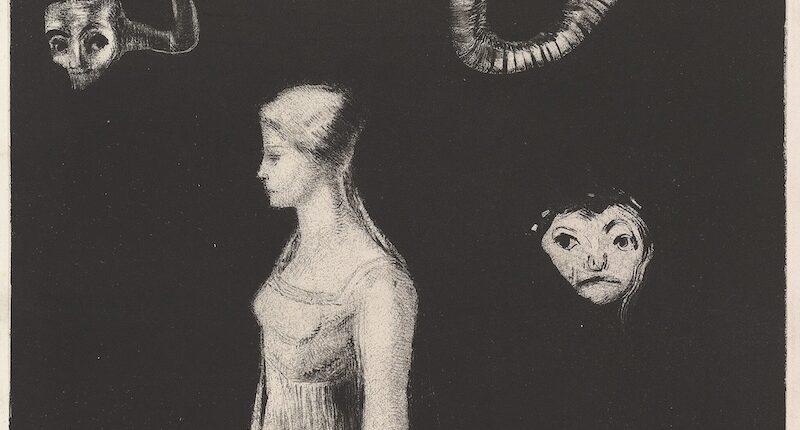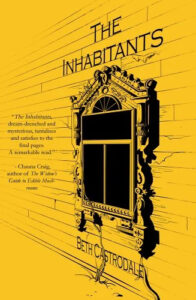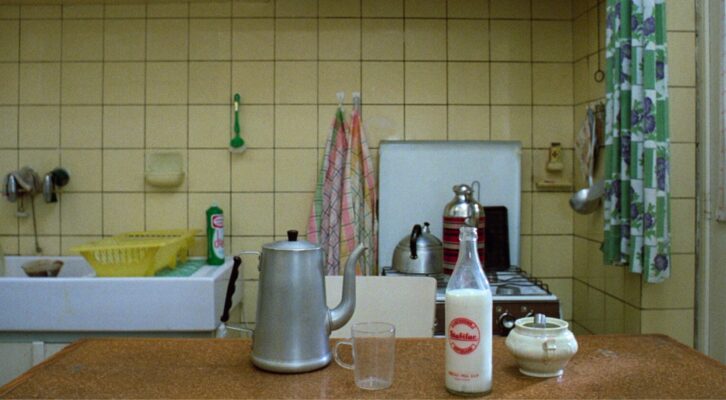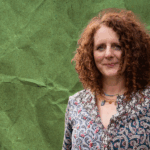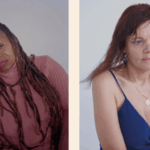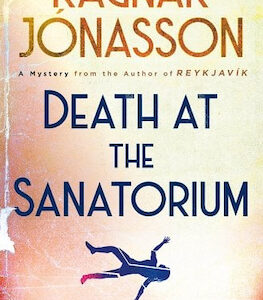“Do you believe in ghosts?”
Though I’ve long been fascinated by ghost stories and the possibilities they suggest–mainly, that death might not completely quiet us, for good or for ill–I’ve never felt comfortable answering this question with an unreserved “Yes.”
This question resurfaced while I worked on my latest novel, The Inhabitants, which features hauntings both literal and figurative. But something beyond the novel was at play–perhaps the fact that I’m far closer to the end of my life than the beginning of it, perhaps the fact that I’m losing more loved ones with every passing year.
My drive to respond to the question, as honestly as possible, led me back to the past, to an experience I didn’t ask for. And it pushed me to attempt a more active, and more personal, investigation in the present.
My Ghost (?) Story
Years ago, when I lived and worked on Cape Cod, I rented an apartment from a kind older couple, who also lived on the property. I learned through a mutual friend that the apartment used to be occupied by their daughter, who’d died a few years before, around age 30. My landlords never mentioned their daughter to me–why would they? Still, learning of their tragic loss made me see them in a slightly different light, and feel more tenderly toward them.
But in the early days, the news didn’t really affect how I felt in the apartment, which I loved from the start. A tiny, two-storied structure with wood-paneled walls and a cottagey ambience, it was close enough to the ocean that almost every night I’d fall asleep to the sound of breaking waves, even in the dead of winter, when all the windows were closed. Though I’d think now and then of the daughter and what had become of her, I didn’t really connect these thoughts to the apartment, perhaps because I had no personal memories of her in that space, or anywhere else. But eventually, some strange events pushed the daughter, and her connection to the apartment, to the fore of my thoughts.
Who–or What–Pranked Me? Several months after I moved in, I returned home to find the casement windows in the bedroom, the only room upstairs, wide open. And though the weather was mild, if drizzly, the thermostat had been cranked to its highest setting. Though I considered the possibility that I hadn’t fastened the window latches adequately, that seemed unlikely. I’d always been a stickler about closing and locking windows and doors before leaving for work, or for any other extended period. And there was absolutely no explanation for the thermostat setting.
There was no sign that someone had broken into the apartment, and I knew that my landlords couldn’t have been responsible for either oddity. In fact, when I ran into the husband a day or so later, he mentioned the open windows and asked if I could take care to keep them closed when it rained. As for the cranked-up thermostat, I couldn’t imagine why he or his wife would have wanted to turn up the heat in balmy weather, and if they’d had any reason to enter the apartment in my absence, or to have a worker do so, they would have informed me in advance.
What if the daughter were responsible?
It was an absurd question but also a natural one given the circumstances. Still, I tried to tamp it down, concluding that there had to be some kind of rational explanation for what had happened. Then, several days later, I once again came home to the wide-open windows, the cranked-up thermostat. This time, there wasn’t a chance I’d been lax with the window latches, because I’d taken pains to close them securely after the first incident.
This heightened my suspicion that the daughter was responsible, and the mental picture I’d made when I first learned of her became far more present: that of a woman about my height, with dark, shoulder-length hair and brown, penetrating eyes. I didn’t know if this vision bore any resemblance to the woman she’d been, because I’d never seen a photograph of her, and because the internet was in its infancy then, there was no way for me to find one readily.
My image of her seemed to be a product of the same involuntary conjuring that creates mental pictures of the characters of every novel or short story I read, and I rarely have any idea why my brain chooses the physical characteristics it does–if choosing is in fact part of the process. After the incidents with the windows and thermostat, there seemed to be a new sureness to my image of her, and to her presence in my mind. (Years later, I searched the internet and found a brief obituary for her but no photographs to confirm or contradict my mental picture of her. This came as a great relief.)
If she were responsible for these incidents, why? I kept returning to the ghost-story trope of spirits who are unsettled by the presence of an intruder in a space they’d occupied in life. But it’s probably presumptuous to think that I had any true sense of what might have been driving the daughter–if, in fact, she’d played any role in what I’d experienced. Again, I never knew her. And it’s quite likely that my suspicions of her involvement resulted from the all-too-human impulse to make connections–and stories–where no logical or factual relationships actually exist.
Given these doubts, I didn’t tell many people about my experiences or suspicions–just a few close friends and a co-worker who’d expressed belief in supernatural phenomena. She offered to perform a ritual in my apartment to move any otherworldly beings along, but as I recall, I told her something to the effect of, “Let me think about that.” Somehow, visions of her waving a smoking bundle of sage throughout my apartment heightened my skepticism, and my sense that my stories and suspicions didn’t warrant such fussing over. In the end, my apartment went un-saged, and in less than a year, I moved into my then-boyfriend’s place–not because of any further incidents. In the months leading up to my move, the windows stayed closed whenever I latched them, and the thermostat remained fully under my control.
Nothing Personal, Just Weirdness. After all these years, my main takeaway is this: despite my vivid mental picture of the daughter (which might or might not have been accurate), the apartment never felt haunted so much as invaded in my absence. I saw the open windows and the turned-up thermostat, I felt the incoming wind and rain and the cranked-up heat, but I never sensed the kind of presence that so many subjects of purported hauntings describe. In other words, the oddities were nothing I could take personally; I was a mere observer.
As I grew older, and became more acquainted with loss and grief, I began to wonder if a more personal experience–in particular, a connection with loved ones who’d died–would ever be possible, and credible. Fueling these musings was my work on my forthcoming novel, The Inhabitants. Grieving the loss of her mother, the protagonist takes a strange comfort from paranormal reality shows and the possibilities they suggest. Not unlike my protagonist, I imagined reconnecting to my late parents, even as I doubted that this could happen.
Eventually, after years of dismissing such a move, curiosity won out over my deep-seated skepticism: I decided to seek out the services of a medium … actually, two.
My Experiences with Mediums
My session with the first medium took place over Zoom, and my session with the second medium took place over the phone. During our exchanges, I kept an ear out not just for inaccurate statements about deceased loved ones but also for statements that, though accurate, were too vague to apply to just one person (e.g., “Your father loved ice cream.”). I also listened out for accurate statements that could have been gleaned from outside sources–for example, my author website or other online materials. At the same time I resolved that, throughout both sessions, I’d try to keep my mind as open as possible.
I also bore in mind both mediums’ warnings that they couldn’t control what spiritual visitors–if any–might come through for them. Consequently, I didn’t get my hopes up about hearing from my parents.
Experience 1: I’m a Stranger at This Party. Throughout this session, the medium seemed like a kindly host of an open house in which any number of (unseen) guests might drop by. Unfortunately, no one who showed up seemed familiar.
To give a sampling, there was a “dapper” educator who came across as “fatherly.” There were two “wealthy but naive” sisters “who might be family.” There was a woman who seemed to enjoy the spotlight, an actor or some other renowned figure. None of these people rang a bell, even after the medium provided further details about them. As for my parents, they seemed to have skipped the party.
As the session progressed, I felt my exchanges with the medium becoming more and more tense, more fraught with awkward pauses.
Near the end of our time together, the medium suggested that I might be the problem, and she asked if I’d come into the session reluctantly. This was the one thing she nailed. For a long time, reaching out to a medium had zero appeal to me, and my time with her reminded me why. Still, I’d never intended to be a party pooper. To the contrary, I’d been hoping that I’d recognize someone, or something, in the torrent of details she shared.
That’s why I decided to give my medium experiment one more shot. But this time, I was going to be more judicious. In my search for the first medium, I relied on testimonials, reviews, and online searches for misbehavior–not the strongest standards, to be sure. The second time around, I learned of a research-based certification protocol for mediums, under which they had to undergo a detailed vetting process that included quintuple-blinded readings. Based on this information, I ended up choosing a certified medium for my second session. Though she was heavily booked, I made an appointment and started counting down the months until our session.
Experience 2: I’m Still Processing It. Given what happened with the first medium, I braced myself for further disappointment. But within just a few minutes of my session with the second medium, I understood that this was going to be an entirely different experience. At the start of our conversation, she shared a few details that seemed inextricably connected to my mother. For instance, she mentioned my mother’s artwork and said my mom was “so happy” that I still have some of her creations. Here, she accurately described a pastel drawing of my mom’s that’s hanging in my front bedroom.
Beyond this, the medium said my mom is “very glad” that I’m wearing the ring she gave me. Over the 25 years I’ve been married, the only ring I’ve worn is my maternal grandmother’s wedding ring, a gift from my mother. According to the medium, my mother also mentioned that I still have her red sweater: true. It was one of the few possessions of hers that I decided to keep because she wore it so often.
Furthermore, the medium accurately described my father as someone who “liked to joke around,” and she correctly stated he “had to do everything” around the house, inside and out. Also, she accurately identified two conditions he suffered from, naming the one that ended his life.
Toward the end of the session, the medium mentioned an “Angie” and described her as an avid cook and gardener who lived in the country. This matched my father’s description of his mother, my Grandma Angela, who died before I was born. Here, I was struck by the irony of Grandma entering the conversation. As my father put it, she had a finely tuned bullshit detector (one that he seemed to have inherited), and she regularly dismissed “old country” superstitions discussed by neighbors who, like her and my grandpa, had come over from Italy. One claim that earned a hand swing from her was that loved ones’ spirits could “walk up” from their graves.
The medium made several other accurate statements that I’m not going to mention because they weren’t specific enough or could have been found online or elsewhere.
Did she ever strike out? Yes, but not often. For example, she mentioned a connection to Vermont. That didn’t ring a bell, nor did another description she offered, of someone wearing wingtip shoes.
Where Does All This Leave Me?
I’m not sure I’m any closer to a definitive answer to the opening question (“Do you believe in ghosts?”). My experience on the Cape remains a conundrum, and I’m still working through my feelings about the session with the second medium, which has offered much food for contemplation.
But based on the eerily specific–and accurate–details mentioned by the second medium, I’m more open to a possibility I’d doubted before: that, somehow, our consciousness might survive our physical death.
Furthermore, I can’t help but think there must be a reason why so many ordinary, down-to-earth-seeming people–many of whom describe themselves as skeptics–have reported what they’ve perceived to be contacts with the dead, or with distant friends or loved ones facing death or endangerment. To me, dismissing such stories out of hand feels short-sighted. So I’m pleased that certain researchers, such as those at the Division of Perceptual Studies at the University of Virginia, are investigating the possibility of consciousness surviving physical death.
I’m hoping that further research efforts, perhaps involving new tools or methods, will shed more light on this most puzzling of subjects. And maybe I’ll find out more when I’m dead myself. In the meantime, I’ll keep sorting through my own experiences and seeing what more I might learn. All the while, I’ll keep my bullshit-detecting grandma in mind.
***

